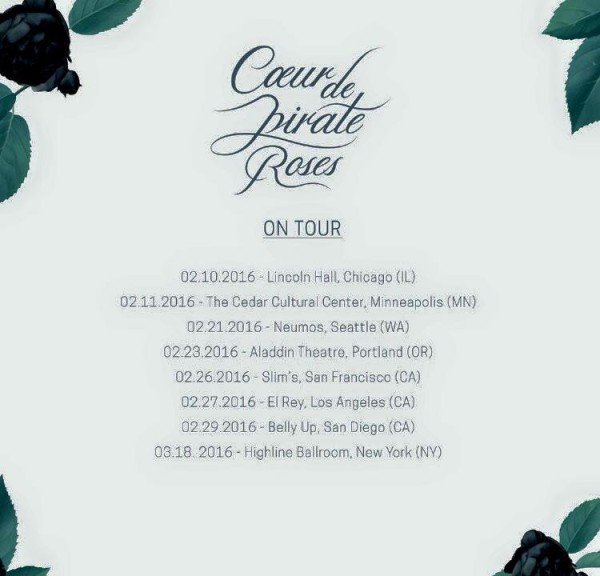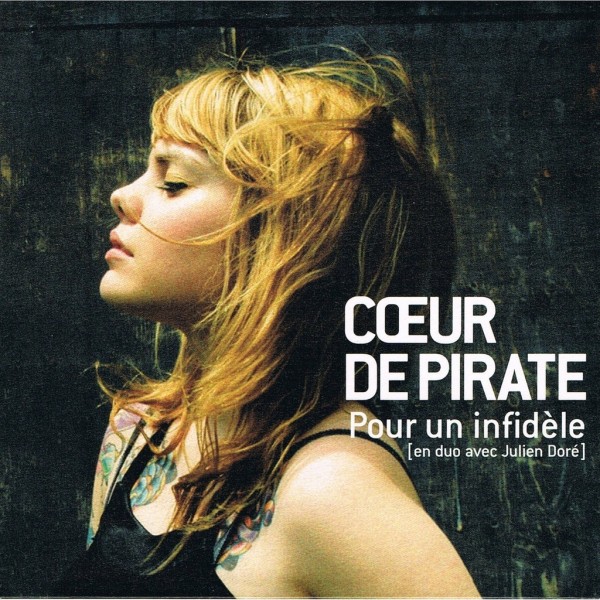by Michael McCarthy
I still recall the first time I heard Cœur de Pirate, otherwise known as Béatrice Martin. I’d just watched a video by French pop diva Mylène Farmer on Youtube and it suggested a Cœur de Pirate song from her debut album next. It was “Comme des enfants” and it put a spell on me, making me feel like I was transported to1960’s Paris, hearing Jane Birkin for the very first time. Granted, Birkin and Martin have different voices, but there was no denying that Martin’s music sounded like it could have been recorded back then and I absolutely loved it. It was like a breath of fresh air. In the video, she’s shown playing a small piano in a room full of people and I immediately wished that I was in that room. Needless to say I bought her album from iTunes minutes later and I’ve been a fan ever since.
One of the things that makes Martin’s career so interesting is that you never know what she’s going to do next. She gave us two pristine French singer/songwriter pop albums but then she threw us a couple of curveballs. First, in 2013 she did music for the Canadian television series Trauma, for which she did all cover songs, all of which were in English. Then in 2014 she did the score for a videogame called Child of Light. Now she’s back with her new album, Roses, which is full of beautiful, charming songs, many even in English. So, if you haven’t heard her music before, I highly suggest you listen to it. Naturally, I’ve posted a few of her videos here for your enjoyment. So, read on and get to know one of today’s very best singer/songwriters.
MM: Where are you based out of today? You don’t go on tour until next week, right?
BM: Yeah, we’re in Montréal right now, but we leave on Friday.
MM: Are you excited?
BM: Yeah, I am. It’s kind of crazy because all my dates in Canada sold out. So, I wasn’t expecting that at all. I’m really, really excited.
MM: Did you have to relocate any of the concerts from smaller venues to larger ones to meet the demand?
BM: I’ll just come back, I think. I think we’ll have some other shows planned later on. So, for this, it’s fine. But hopefully I’ll come back, yeah.
MM: Why did you call the new album Roses?
BM: Because for me, I love the fact that flowers aren’t really forever. They kind of wither and die. You have to take care of them. It’s the way that I see music in general. It’s kind of up in the air, you cannot posssess music. You can, but it’s still out there. So, that aspect. And also the fact that whenever you offer flowers or a rose, it’s kind of like a letter. It’s something that you want to say. And each song is a message to someone. Or to myself. That’s kind of how I saw it.
https://youtu.be/9p-9U53txWQ
MM: Why did you choose to have black roses on the cover?
BM: Oh, just ’cause it’s me. [laughs] It wouldn’t be very me to have pink or red roses.
MM: I didn’t even realize they were black until I was listening to the album again this morning.
BM. Oh, that’s very funny.
MM: You released songs in English for the first time on the Trauma soundtrack. Did you do that primarily as practice for singing and writing in English?
BM: It was good practice. I’m not gonna lie. But it was just kind of a job, the Trauma soundtrack. It was something that was ordered on behalf of a TV show, so it wasn’t something that I did just to see if I could do it. The real exercise was with Roses.
MM: How did writing songs in English differ from writing songs in French?
BM: I mean, it is different. Even though I am bilingual I’m still very used to writing in French. It comes very naturally to me because I’ve been doing it for so long. I didn’t know if I would be able to write in English as well. If the poetry and the images would make any sense. If they’d be corny. So, it was kind of a challenge for me, but I’m glad I did it. I got it proofread and everything and it sounded fine.

MM: Do you feel like your songs in French are more poetic?
BM: I know the feeling is a little bit different. A nostalgia that I have in French that I don’t necessarily have in English. I don’t know why. Maybe because it’s newer to me. But it’s nice because I get to do various and different images and it doesn’t mean the same thing. That’s what I like about it.
MM: Was writing score for the Child of Light soundtrack harder or easier than writing regular songs?
BM: Again, it was like doing a job. It was composing instrumental tracks. They would bring out certain guidelines that I needed to respect. In doing the music for a videogame, it’s very particular. It’s not like a movie or anything. It’s abstract. It was in the beginning of the process of developing of the game. So, I didn’t have anything to base myself on. Just mood boards. It was hard but I’m really glad I got to do it and I’m really happy that they got to see this side of me. Just not the singer, the person who actually knows how to write music.
MM: Did you have any reservations about doing music for a videogame or are you a big videogame fan?
BM: It’s part of my background. I’ve been playing videogames, obviously. Not a lot of them but it’s still part of my growing up. I was a fan of Final Fantasy. I was a fan of the music that they did in this videogame called Journey. And I was a big fan of Ubisoft and I knew all of their games. I just kind of based myself on that and other games. So, yeah, it was a good challenge. I’m happy I got to do it.
MM: Aside from writing “The Way Back Home” for your daughter, has being a wife and mother changed your approach to songwriting?
BM: Well, it changes everything. So, obviously, it did change my songwriting. There’s a more positive aspect to it. I’m less pessimistic about life. In my songwriting before I was always blaming other people. It was all about revenge. Now it’s mostly about trying to figure out what’s wrong and dealing with my own insecurities. For my sake and for her sake and for the sake of everybody.
MM: Is it harder to write sad songs now that you’re happily married?
BM: I can still be sad about things. So, no. I had a lot of things that I needed to address before that I didn’t address on my other albums. Because I was too busy blaming other people. I did it with this album.
MM: Have any of your fans in French-speaking places complained about you doing songs in English?
BM: Ah, you know what? They didn’t. I was scared at first. We’re very protective of the French language here in Québec. I understand why. And in France, too, I was kind of wondering if they would not like it. So far, people have been really happy and the reception’s great. And I get to do both things now. I get to do shows elsewhere in Canada and in the States and I get more shows because of it. And I can still do French music in Québec and France.
MM: Does whether you do “Oublie-moi” or “Carry On” depend on where you’re playing?
BM: Yeah, that’s the only thing that changes. Otherwise, it’s the same show.
MM: There’s a new version of “I Don’t Want To Break Your Heart” featuring a rap verse by Allan Kingdom. Is this the first time you’ve collaborated with a rap artist?
BM: Yeah, it’s the first time.
MM: Did you meet each other in the studio or did he do his part on his own? How did that work?
BM: He did his part on his own. I contacted him via Twitter. I was a big fan and I asked him. It’s a different world now. That’s how you get in touch with people. And, yeah, he said yes, so that was good.
MM: Now that he’s on the song, will the album be re-released with that version?
BM: It’s already out. It’s there. It’s on the album.
MM: It seems like “Carry On” is being remixed by more and more people every day. What are your favorites?
BM: I guess I like them all. They’re all very different. But my first pick was the Felix Cartel one because he’s one of my good friends and he was the first one to remix it. And he’s Canadian, too. It was a cool thing.
MM: Have you thought about releasing an album of remixes?
BM: I don’t know. I mean, I don’t know. [laughs]
MM: Your new songs remind me of Sia’s last couple of albums. Is she an influence?
BM: The early Sia stuff. The album with “Soon We’ll Be Found” and all of that. I am a big fan. Obviously, she’s been an influence on me. I’m not such a fan of the recent stuff. But I still respect that she’s doing that. She’s a great artist.
MM: So, who are your influences these days, both French and English or any other languages?
BM: Obviously, my influences in France, if anything, was the Françoise Hardy, Barbara and all of that. And I have a couple of bands here in Québec like Malajube. Malajube was a big influence on me. On the English side, obviously, I’m a big of Feist and, I don’t know, like Sia. I was really into Sam Cooke at one point. And I would just like to know everything. My Dad used to sing Dean Martin to me. So, all of the old stuff. Even country stuff. I’m a big fan of Townes Van Zandt. So, in my songwriting there’s a lot of country influences even though it doesn’t really show. In the form, it’s really country, how I write, it’s weird.
MM: How do you feel about doing TV interviews and what is the strangest one you’ve ever done? Have you gone to Japan and done those crazy ones yet?
BM: Oh, no, I haven’t done that yet. [both laugh] I’ve done some very long ones, you know? Where you have to stay there for like six hours and you can never go out. You can never pee. [both laugh]
But I haven’t had really weird encounters. So far, it’s been good. It’s weird to be your true self in interviews. You try to show as much as you can and talk about what you can as well. But it’s really hard to really confide and be your true self. So, I mean, I try to do that in concert.
MM: You called yourself Cœur de Pirate because you wanted it to be like a band. Do you ever regret not going by your real name now?
BM: I don’t know. When I started trying to get into the English market it was kind of hard for people to say the name. I was skeptical. But on the other hand it’s kind of cool. And I like the fact that it’s a French name and it gives a little bit of an edge to it. People are confused by it, too. So, it’s interesting. They’re like, oh, what’s this? And they try to look it up and it’s cool.
MM: You did “Pour Un Infidèle” with Julien Doré and Jimmy Hunt. I’ve always wondered – why were there two versions?
BM: Because there was one for France. They’re like that over there. [laughs] They need certain specific people for that. And here, Jimmy Hunt was one of my friends so I did it first with him.
MM: I’m a tattoo junkie, so I was wondering if you could tell us about a couple of your tattoos and what they mean to you?
BM: I have a lot of them. A lot of them I get while I travel. When I love somebody’s work I try to get something from them. I was recording in Sweden and I really liked a tattoo artist over there. And, yeah, it was nice. It’s usually like that that it works.
MM: Are there any tattoo artists in particular that you would recommend to your fans?
BM: In Canada or internationally?
MM: It doesn’t matter.
BM: My favorite one is a girl that works in Paris. Her name is Maud Dardeau and she works at Tin Tin Tatouage. It’s a pretty famous shop. And she’s great. She does all of this wonderful dot work.
MM: What is it like getting recognized in public now that you’re getting more and more popular? Do swarms of people come running over?
BM: [laughs] No, not really. They’re pretty chill in Canada for that. People come up to you and they say hi. So, it’s fine. It’s OK.
MM: We’re from the Boston area. Do you have any particular memories of Boston?
BM: Yes, last time I was in Boston it was sold out and it was amazing. It was like a weekday. It was at the Bretton Hall. It was great because all of these people from Harvard came. People were in exams, so more people would have come [otherwise] but it was a great, great, great experience. I was super happy.
MM: Now, at the end of our interviews we usually ask a few random questions. Is that cool?
BM: Sure. Yeah, perfect.
MM: One is, have you ever taken advice offered in a negative review?
BM: No. I cannot do that. I used to be very concerned about what people would say about me in the beginning of my career but now it’s kind of… No. I do me.
MM: What’s the strangest gift you’ve ever received from a fan?
BM: I have received a giant bunny plush toy. It’s gigantic, like the size of my kid. A little taller than my kid. And I still have it.
MM: Lastly, what are some of your favorite books, albums, movies or tv shows?
BM: I’m a huge Tina Fey/Amy Poehler fan. My favorite tv show would be Parks & Recreation. Also, I guess my favorite book would be a Kundera book. Milan Kundera There’s a movie that was made of it. [looks for the name] The Unbearable Lightness of Being! And also I guess my favorite movie would be The Outsiders.
Extra special thanks to Béatrice for taking the time to talk to us! Thanks also to Daniel at Forcefield PR for setting it up!
Twitter: @beatricepirate




Leave a Reply to Star Cancel reply